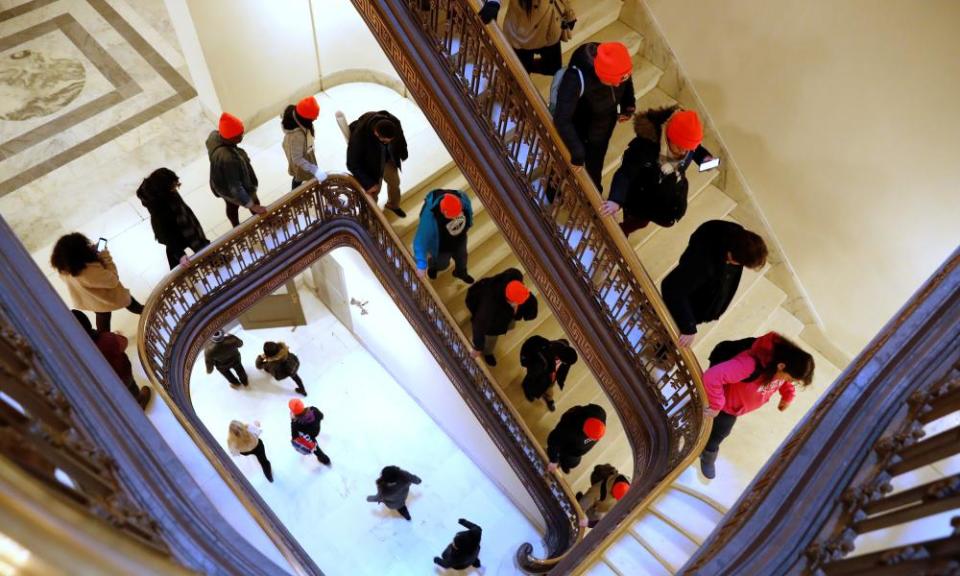US government shutdown looms as Republicans struggle to pitch bill
Congress grapples with yet another round of brinkmanship over keeping the government open, with Daca remaining a point of division

Capitol Hill edged closer to a potential shutdown on Wednesday, as Republicans struggled to come up with a bill to keep the government open past a funding deadline on Friday.
Democrats have long insisted that they will not support any legislation to further fund the government unless protections are added for the “Dreamers”, undocumented immigrants who were brought to the United States as children. An Obama-era program that protected them from deportation was cancelled by the Trump administration last year, and is set to expire on 5 March.
A potential compromise on the program, negotiated by a bipartisan group of senators, was vetoed in a White House meeting last week in which Donald Trump reportedly disparaged a number of nations as “shithole countries”. The resulting impasse forced Republicans to introduce a short-term bill, instead, which would keep the government open for one month, repeal several taxes, and renew the Children’s Health Insurance Program (Chip) for six years, a top Democratic priority.
Who are the Dreamers?
Dreamers are young immigrants who would qualify for the Deferred Action for Childhood Arrival (Daca) program, enacted under Barack Obama in 2012. Most people in the program entered the US as children and have lived in the US for years “undocumented”. Daca gave them temporary protection from deportation and work permits. Daca was only available to people younger than 31 on 15 June 2012, who arrived in the US before turning 16 and lived there continuously since June 2007. Most Dreamers are from Mexico, El Salvador, Guatemala and Honduras and the largest numbers live in California, Texas, Florida and New York. Donald Trump cancelled the program in September but has also said repeatedly he wants Congress to develop a program to “help” the population.
What will happen to the Dreamers?
Under the Trump administration, new applications under Daca will no longer be accepted. For those currently in the program, their legal status and other Daca-related permits (such as to work and attend college) will begin expiring in March 2018 – unless Congress passes legislation allowing a new channel for temporary or permanent legal immigration status – and Dreamers will all lose their status by March 2020.
Technically, as their statuses lapse they could be deported and sent back to countries many have no familiarity with. It is still unclear whether this would happen. Fear had been rising in the run-up to last week’s announcement. Those with work permits expiring between 5 September 2017 and 5 March 2018 will be allowed to apply for renewal by 5 October.
What does this week's ruling by Judge William Alsup mean?
In his ruling, Alsup ordered the Trump administration to restart the program, allowing Daca recipients who already qualify for the program to submit applications for renewal.
However, he said the federal government did not have to process new applications from people who had not previously received protection under the program.
When the Trump administration ended the Daca program, it allowed Daca recipients whose legal status expired on or before 5 March to renew their legal status. Roughly 22,000 recipients failed to successfully renew their legal status for various reasons.
Legal experts and immigration advocates are advising Daca recipients not to file for renewal until the administration provides more information about how it intends to comply with the ruling.
“These next days and weeks are going to create a lot of confusion on the legal front,” said Marielena Hincapie, executive director of the National Immigration Law Center, which has filed a separate lawsuit against the Trump administration’s termination of Daca.
This bill was met with “broad and strong revulsion” from Senate Democrats, said Chuck Schumer, the minority leader in the chamber. Because of a 60-vote filibuster rule, Republicans need nine Democrats in the Senate to vote for any budget deal.
However the Senate majority leader, Mitch McConnell, suggested that he was less concerned with the need for Democratic votes than the obstacle of Trump himself.
“I am looking for something that President Trump supports and he has not yet indicated what measure he is willing to sign,” McConnell said. “As soon as we figure out what he is for, then I would be convinced that we are not just spinning our wheels going through this issue on the floor, but actually dealing with a bill that has a chance to become law.”
Trump repeated his criticism of the bipartisan proposal in an interview with Reuters on Wednesday. “It’s the opposite of what I campaigned for,” he said, adding that he thought the compromise “very, very weak”.
In the meantime, as Congress points towards yet another round of brinkmanship over keeping the government open, lawmakers are growing frustrated with the process.
“A lot of Americans are scratching their heads and saying we didn’t know the Jerry Springer show was in syndication, what’s going on up there,” said Senator John Kennedy, a Republican from Louisiana.

